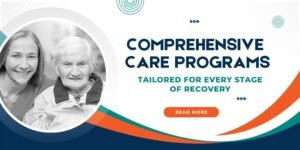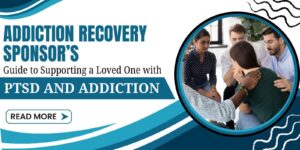Issues like addiction, substance abuse and mental disorder can feel isolating, but the impact of such conditions is never in isolation as the consequences of such conditions affect the patient’s family members and loved ones massively. Addiction can damage relationships and weaken families. Family members are often not able to understand why the affected person cannot abstain from drugs and hence lose trust in them. On the other hand, the person suffering from addiction fails to understand the value of his/her family as they are under the influence of substances and that becomes more important to them. Amidst, Addiction Family programs or family program therapies can help to bridge this gap in communication and revive emotional stability.
Our navigators will help you take back control of your life.
When you call our helpline, an admissions navigator is there to listen to you, answer any questions you have, and provide the support that you need—all 100% confidentially.
Family programs therapies where all the family members and other loved ones of the patient can participate together and become an integrated part of the recovery process. Researches have proved that support from family is very important for successful recovery from addiction. Involvement of families in the recovery process makes it easier for everyone to deal with the situation.
Drug Addiction and alcohol addiction family programs give the patient and their family an opportunity to elaborately learn about the cause and affect of addiction and mental health crisis. They begin to understand the situation from each other’s perspective and build better communication. Family members are able to find how they can contribute to reach the goal of sobriety. The process starts with gaining awareness of the extent of damage caused by addiction, which might be weakening bonds in the various relationships in the family, financial hardships and loss of sense of safety.
In family program therapies, patients and families get a space to be heard and hear all the parties involved. They learn to interpret the feelings appropriately and then act accordingly. Better communication and more understanding also let the family members understand the role they might have played which led to addiction as well as all the ways that they are affected by the patient’s mental health issue or addiction. With all these insights gathered, clients and families come in a position to make meaningful changes in their lifestyles and move ahead on the path to recovery.
It is highly recommended to involve family members in the treatment for addiction. Support from family not only motivates the patient, their involvement adds to the treatment itself. As family members are educated about the process in the these therapies and programs, they can help better to sustain it. They become more aware of what they need to do and what they should avoid in order to achieve best results. Participation by family and loved ones can encourage the patient to continue the treatment more honestly while decreasing the chances of relapse. This improves the patient’s social and personal relationships which in return acts like a reward and further encourages to retain sobriety.
A major role of family program therapies is to strengthen family communication and appreciating everybody’s point of view. There are activities and different therapy sessions that educate families about addiction, co-occurring mental illness and show them how they can cope up with their current situation.
As the addiction family program progresses, clients and their loved ones begin reconstructing their lives and working on their relationships. Participants are able to open up about the various emotions they might be going through. Expressing all their hidden or suppressed emotions like frustration, guilt, fear or even hopes and dreams gives them the strength to overcome denial and other challenges. It provides them a safe space to break the stigma associated with addiction and mental illness and rather focus on improving the situation. Family programs help in the following ways:
- Let you navigate through the chaos of addiction
- You receive warmth of empathy and understanding
- Begins positive changes interaction patterns
- You develop listening and communication skills
- You learn healthy coping skills
- You develop problem-solving skills
- Improved conflict resolution skills and relationships
- Lowers the risk of relapse by increasing awareness of the warning signs
- Helps all participants understand addiction, dual diagnosis and mental illness better and how it affects families.
- Increase the chances of treatment retention.
- Enables a better understanding of what to expect from treatment as outcome and how to continue the recovery.
- Explains families the importance of taking responsibility for their own emotional, physical, and spiritual well-being.
Residential Family Inpatient Treatment is a great choice in case of severe addiction. There are number of benefits of pursuing Family-Based Residential Inpatient Treatment:
Safe detox: Medical detox is the first most crucial part of inpatient addiction treatment. Detox process must be guided by trained professionals to minimise the risk of painful and dangerous withdrawal symptoms.
Experienced Addiction Treatment Team: Trained medical attendants help you to address the various underlying issues through many types of group therapies, experiential and alternative treatment approaches.
Support for Loved Ones: Inpatient family rehab programs include family therapy sessions. Family members learn about addiction and how to cope up with it. They become able to take care of the patient as well as themselves during the healing process.
Safe environment: The treatment centers become safe spaces where there are less triggers and other obstacles to recovery, hence enabling the client to fully focus on improvement.
Immediate care in case of emergencies: Withdrawal and relapse are the major risks in the addiction recovery process. Such situations can be dangerous for the patient and also to the people who are near them. Inpatient treatment set up provides an all time care set up by professionals which lowers the risk of harmful actions and other possible dangers.
Check to see if your insurance is in-network at an American Addiction Centers location
We’ll instantly check the coverage offered by your insurance provider.

The main desired goal of family programs for mental health or addiction treatment is to enable the patient’s family members to understand the patient’s medical situation better along with the related psychological and social components. Following are the best outcomes that can be expected from a family program:
- Increase in support from family: as the family realises that the problem of addiction is directly and indirectly causing issues in the family, they are motivated to work as a team to fight addiction and achieve freedom from it.
- Identify and modify trigger points that work against recovery: : relationship patterns might need some alterations in order to stop triggering substance consumption. Better communication solves a lot of the complications.
- Prepare family members for what to expect: Family members might end up feeling disappointed, hence do not support wholeheartedly if they have unrealistic expectations.
- Identify warning signs: : if family members understand warning signs, they can be very helpful in preventing episodes of relapse.
- Understand the causes and effects of substance use disorders:family dysfunctions and addiction can be both cause and effect of each other, family counselors help clients figure out the ways to break through this vicious circle.
- Utilise family strengths: families might have specific members or other aspects that help them come closer and be more devoted towards the recovery process as the end goal is unanimously to rebuild a healthy family.
- Long-term support as a family: as the patient begins to recover, all family members need to take care of their own emotional, physical, and spiritual health and look out for each other as well.
Different clients have different needs, everybody has a different story and family set up. Based on the unique issues, the therapist may use different types of family therapies, few of the most common ones are as follows:
- Behavioral couples therapy (BCT): Intended for married or cohabiting couples. The person with the SUD shares their intent not to drink or use drugs and the partner extends full support in the efforts to stay abstinent.
- Family behavior therapy (FBT): This model is for adults and adolescents with SUDs. It’s sort of a pick-and-choose your own therapy from a list of options. It involves efforts from the entire family in changing the behavior of the person with SUD.
- Brief strategic family therapy (BSFT): This is a popular option for families dealing with adolescents who have SUDs and focuses on improving family interactions. Research suggests that unhealthy dynamics in the family is the most common root cause for adolescent substance abuse.
- Functional family therapy (FFT): FFT focuses on improving family interactions as well, practices like effective communication techniques, problem-solving, conflict resolution, parenting skills, and behavioral contracts are encouraged.
- Solution-focused brief therapy: This can be helpful for families dealing with co-occurring disorders, this therapy focuses on finding solutions for specific problems instead of pinpointing at the reason.
- Community reinforcement and family training (CRAFT): CRAFT uses a positive reinforcement approach to change the substance use behaviors.
- Multisystemic therapy (MST):This therapy is designed for adolescents with SUDs, along with violent behaviors, and/or criminal records.
- Multi-dimensional family therapy (MDFT):A treatment approach to deal with adolescents with severe SUDS and their families through a comprehensive treatment program that also involves the school, legal system, and other relevant parties.
Family therapy programs act as a bridge between the family members and the one who is suffering from addiction as well as between the current situation and the goal of freedom from addiction. This is achieved in the following ways:
- Understand Signs of Relapse Relapse is one of the major dangers a patient experiences while getting treatment for addiction. Family programs educate the family members to trace signs of relapse and judge better when to step in to help the patient. They are taught what exactly they need to do in such scenarios.
- Setting Healthy Boundaries Boundaries are very important for a smoother treatment. Loved ones or family members must learn to help the patient to control their destructive behavior. Healthy boundaries and clear expectations make it much easier for all the parties involved.
- Start to Communicate Better Good communication solves a lot of issues at their starting points. Family programs allow you to learn the ways in which family dynamics play a major role in achieving the goal and to manage that aspect better. Listening to and understanding each other, expressing themselves and trying to help each other to come out of the current situation helps everyone involved.
Addiction and addiction treatment are delicate issues, hence need to be handled extremely carefully. Family therapy programs have trained and licensed professionals who are able to navigate through all the emotional, mental and physical difficulties. They explain to the patient and the family members how to manage extreme situations and behave accordingly to minimize the consequences. Family is the biggest strength and support that one can have. Just like happiness doubles when with family, the need for family’s love and support also increases in difficult times.









